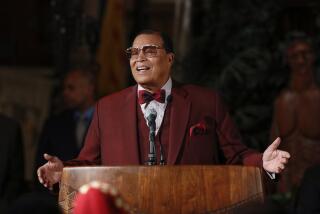One Neighborhood Where Farrakhan’s Words Seem to Hit Home
- Share via
Andre Ransom guided his lemon-yellow Chevy Impala to a curb on 106th Street. Scooting out of the driver’s seat, he perched on the trunk, his back to the motto “Only The Strong Survive” spray-painted across the car’s rear window.
“Things are changing,” said the 26-year-old Ransom, surveying his Athens district neighborhood. “Black people around here, they see what’s taking place. A lot of blacks are waking up. Before (Nation of Islam leader Louis) Farrakhan came to deliver that message, there were a lot of brothers blinded. But something is happening now. We’re coming together.”
Ransom, a former member of the Crips who attended Friday’s speech, paused momentarily.
“Even some Crips are willing to say: ‘We aren’t going to gang bang,’ ” he continued, sitting a few yards from the 106th Street apartment house outside of which a Nation of Islam member was slain on Jan. 23 during a clash with sheriff’s deputies. Since Farrakhan’s speech Friday night, gang members “are willing to stop some of this killing,” he said.
His words echoed the sentiments of several people in his Athens neighborhood in reaction Saturday to Farrakhan’s address before a sold-out house at the Los Angeles Sports Arena.
Although some interviewed Saturday criticized Farrakhan for “not really doing anything but making speeches,” others praised the fiery Muslim minister.
“He was right on the mark because he opened some eyes,” said Horace Hall, 26, who lives on 107th Street and also attended the speech. “Society--or the ‘white man’ as some like to say--is creating an image of us to other people. What struck me most was when he asked who’s guiding our people. It made me think: ‘Are we acting in our best interest, doing what’s best for us?’ ”
Hall conceded that he went in with “some misconceptions about the man.”
“I have always been interested in him,” he said. “But the Oliver Beasley incident broke the ice for me. That made me decide I had to go see him. I agreed with him more than I thought I would.”
During the program, dubbed “Stop The Killing,” Farrakhan labeled the government’s “so-called war on drugs a war on the black community,” saying that many law enforcement officers use drugs as an excuse to abuse black people.
He suggested that Muslims be allowed to purge neighborhoods of drug dealing and, if possible, to reform willing drug dealers and gang members. He said such projects have been successful in Washington, D.C., and on a smaller scale in Los Angeles.
In the interim, he said, the city should sanction a citizen’s police review board to investigate allegations of police misconduct in the city.
Farrakhan said that, by creating such an independent board, “you will save this city from eruption.”
At a news conference Saturday, Farrakhan repeated calls for the review board and for a “fair investigation” of the Beasley shooting.
He added that the Nation of Islam’s investigation into the shooting turned up “eyewitness accounts that the young man was shot, wounded and fell to the ground. . . . He was killed by a bullet to the head at close range as he pleaded with the officer not to kill him.”
Despite the ovations that punctuated Farrakhan’s remarks at the Sports Arena, some who attended the program said that they weren’t moved.
Twenty-year-old Khalifamoo Shabazz, an orthodox Muslim who also lives on 107th Street, is one of them.
“I heard him talking about the blue and the red (respective colors of the Crips and Bloods street gangs),” said Shabazz. “But I don’t think any of those so-called leaders touched on the real issue: that we don’t have any programs.”
Shabazz accused the minister of doing little to back up his rhetoric.
“It’s like we’re his puppets,” said Shabazz. “He dictates one thing, but he never follows through. We need programs, concrete programs. He just takes people’s money. I don’t know where that money is going.”
Moments later, Shabazz shook his head and started up 107th Street.
“I don’t think he’s doing anything to save us down here,” he said. “I’m a Muslim, but I probably won’t even make the trip to Mecca because I’ll be dead.”
Staff writer Andrea Ford contributed to this story.
More to Read
Sign up for Essential California
The most important California stories and recommendations in your inbox every morning.
You may occasionally receive promotional content from the Los Angeles Times.













